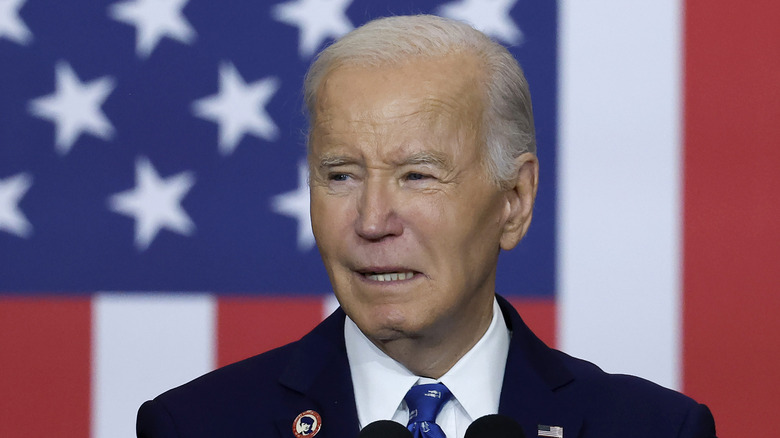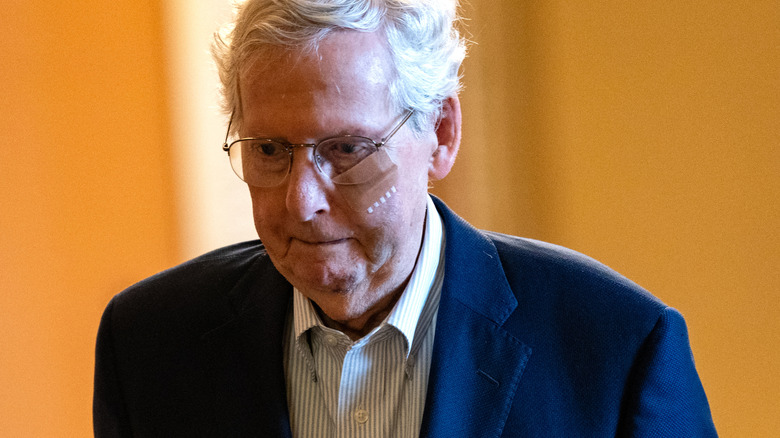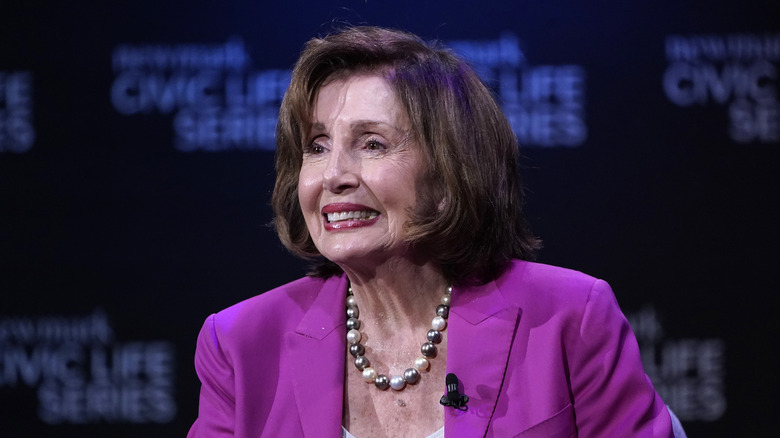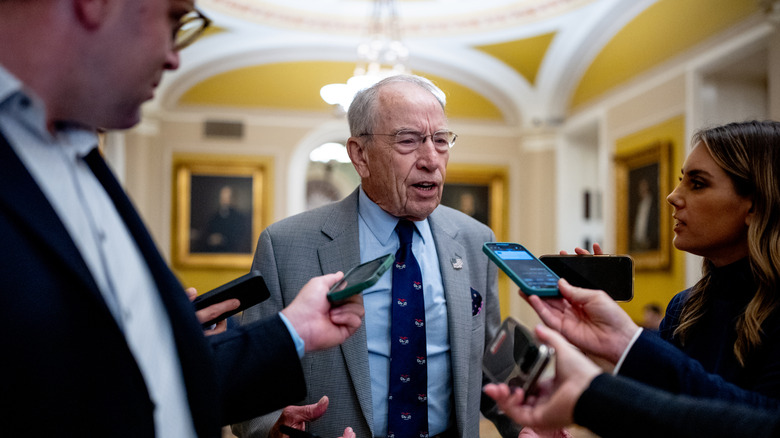5 Politicians We're Seriously Worried About Going Into 2025
Across Democratic and Republican party lines, the one thing that unites this current landscape of American politics is age. While experience and institutional knowledge are certainly valuable things for any politician to have, the advancing age of some key political figures raises serious questions about their ability to meet the physical and mental demands of leadership. Political roles require stamina, adaptability, and the ability to handle crises, and science tells us that these demands grow harder and more complex with age. As we approach 2025, a handful of politicians stand out not only for their remarkable tenures but also for the challenges that come with their advancing age and recent health issues.
This tricky balance between maintaining continuity in leadership and addressing the need for generational change is — and will likely always be — an ongoing debate in American politics. On the one hand, these leaders bring decades of expertise and important historical perspective to their elected offices. On the other, concerns about potential health issues could have a major impact on their ability to serve effectively. Let's take a closer look at five politicians who have us the most worried as we head into the new year.
Mitch McConnell is the longest-serving Senate leader in U.S. history
Mitch McConnell, the Senate minority leader under President Joe Biden, is one of the most enduring figures in American politics. As the longest-serving Senate leader in U.S. history, his influence over legislative processes is simply undeniable. McConnell has navigated decades of partisan challenges and played a central role in shaping the judiciary in America. However, health scares have brought his future into sharp focus. In December, McConnell suffered a fall in the Capitol, resulting in a sprained wrist and facial lacerations.
"[He] tripped following lunch. He sustained a minor cut to the face and sprained his wrist. He has been cleared to resume his schedule," his spokesperson put it simply (via NBC News). This comes after a previous incident in March 2023 that left him temporarily unable to perform his duties due to a concussion. The following February, he announced he was stepping down as Republican leader. However, he plans to remain in the Senate until his term ends in 2027.
His serious injuries really emphasize the risks associated with his age and rigorous schedule. While he has assured the public of his resilience, McConnell's injuries raise concerns about his ability to continue leading in such a demanding capacity.
Nancy Pelosi has faced similar setbacks to Mitch McConnell
Former House Speaker Nancy Pelosi has also been involved in politics for decades, first entering the House of Representatives way back in 1987. Since then, Pelosi has navigated complex legislative landscapes and played a pivotal role in advancing major policies in California and in the United States at large. Yet, at 84 years old, her health setbacks have somewhat overshadowed her accomplishments in this high-profile role. In December, Pelosi fell down a marble staircase while on a trip to Luxembourg, resulting in a broken hip that required emergency replacement surgery.
There's nothing like a broken hip to raise questions about a person's physical capacity to persist. Still, her spokesperson insisted from Europe that "[she] underwent a successful hip replacement and is well on the mend" (via The Hill). No doubt as Pelosi continues to serve in the House of Representatives from California, questions about her health will continue to shape the party's leadership dynamics. Her ability to balance her advisory role with the demands of her age will surely have an influence on the future of the Democratic Party's strategic direction, especially considering she's not the only one to remain in office into her 80s.
Chuck Grassley is the longest-serving Republican senator of all time
At 91 years old, Iowa Senator Chuck Grassley holds the title of the oldest sitting member of Congress following the passing of Dianne Feinstein in September 2023. Grassley's extensive career has spanned decades, marked by his dedication to Iowa and legislative contributions on issues ranging from agriculture to judiciary reform. Despite his advancing age, Grassley's re-election in 2022 shows an enduring popularity among his constituents and an ongoing commitment to public service.
Nevertheless, his advanced age has led to scrutiny from others about his ability to effectively represent his constituents. Grassley's continued service into his 90s has many wondering how senior leaders can possibly balance their extensive experience with the physical demands of their roles. Given his record-breaking tenure, all eyes will be on Grassley's decisions in the coming years — especially considering the significant implications for his state and the Senate alike. His current term will end in January 2029, when Grassley will be 95. Just don't expect him to acknowledge that number: "Age has nothing to do with it," Grassley insisted after his last re-election (via Radio Iowa). "Age is a number."
President Joe Biden is handing over the office to someone barely younger
President Joe Biden, at 82 years old, has faced relentless scrutiny about his age and stamina throughout his presidency. Just because he's leaving office in January doesn't mean we aren't still worried about Biden: While he has demonstrated resilience in navigating a polarized political landscape, fears about his energy levels and frequent slip-ups will still persist into his retirement. The debate about Biden's age is particularly notable given that former (and, now, incoming) President Donald Trump is only about three and a half years younger and has exhibited similar challenges.
This recent influx of aging leaders vying for the presidency raises broader questions about generational change and the future of political leadership in America. Both Biden's and Trump's candidacies illustrate the complexities of delicately navigating these age-related concerns: Can we emphasize the value of experience and leadership continuity while also recognizing that old age comes with unavoidable challenges? Whatever the answer is, don't expect Biden to answer it directly: "It's hard for me to even say how old I am," he joked on an appearance on "The View" (via Business Insider) after dropping out of the 2024 election.
Grace Napolitano's tenure as the oldest Representative is ending
California Representative Grace Napolitano is the oldest sitting member of the House of Representatives at 88 years old. Set to retire in January 2025, her departure marks the end of a distinguished career but also signals a generational shift in congressional leadership for her district. She leaves behind a legacy of advocacy for mental health services and infrastructure improvements, among many years of other accomplishments for San Gabriel Valley and its surrounding areas. As she steps down, the mantle of oldest sitting member will pass to Hal Rogers, an 86-year-old from Kentucky who won his re-election. This win will keep him in office until January 2027, at least.
As 2025 approaches, the health and capacity of these elected officials will unquestionably remain at the forefront of the nation's broader conversation about the need for generational diversity. Alas, time marches on and the nation has no choice but to move forward with who the people have chosen ... meaning we'll have to wait until the next election cycle to see how these age concerns might maintain or disrupt the political landscape of the United States.






